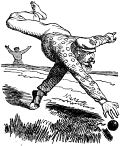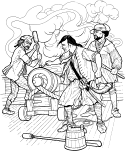Search us!
Search The Word Detective and our family of websites:
This is the easiest way to find a column on a particular word or phrase.
To search for a specific phrase, put it between quotation marks. (note: JavaScript must be turned on in your browser to view results.)
Ask a Question! Puzzled by Posh?
Confounded by Cattycorner?
Baffled by Balderdash?
Flummoxed by Flabbergast?
Perplexed by Pandemonium?
Nonplussed by... Nonplussed?
Annoyed by Alliteration?

Don't be shy!
Send in your question!
Columns from 1995 to 2006 are slowly being added to the above archives. For the moment, they can best be found by using the Search box at the top of this column.
 If you would like to be notified when each monthly update is posted here, sign up for our free email notification list.
If you would like to be notified when each monthly update is posted here, sign up for our free email notification list.
Trivia
All contents herein (except the illustrations, which are in the public domain) are Copyright © 1995-2020 Evan Morris & Kathy Wollard. Reproduction without written permission is prohibited, with the exception that teachers in public schools may duplicate and distribute the material here for classroom use.
Any typos found are yours to keep.
And remember, kids,
Semper Ubi Sub Ubi
|
Wild pitch.
Dear Word Detective: A local newspaper writer wrote that someone was “in the throws of despair.” Rather than going ballistic, I sat down and wrote him that I thought that you “throw” a ball, but someone is in the “throes of despair.” Since then, believe it or not, I read the same mistake, “throws of despair,” in a book that was written this year. What gives? Does everyone else know something that I don’t know? Could “throws of despair” really be the correct cliche? — John.
 Gosharootie, you’re right. If one were to Google “in the throws” (with the quotation marks to search for that exact phrase), one would find about 154,000 instances of the phrase online. Many of those, granted, refer to a “throws clause” in computer programming (don’t ask me). But many, many of those hits are folks using “in the throws” where you and I would write “throes.” I even stumbled across a remarkably inept use of both the standard and non-standard “throws” in a single sentence in a newspaper review of a book of short stories called “The Evil B.B. Chow” (“Here another young woman in the throws of a personal crisis throws herself at a middle-aged Chinese computer repairman”). Gosharootie, you’re right. If one were to Google “in the throws” (with the quotation marks to search for that exact phrase), one would find about 154,000 instances of the phrase online. Many of those, granted, refer to a “throws clause” in computer programming (don’t ask me). But many, many of those hits are folks using “in the throws” where you and I would write “throes.” I even stumbled across a remarkably inept use of both the standard and non-standard “throws” in a single sentence in a newspaper review of a book of short stories called “The Evil B.B. Chow” (“Here another young woman in the throws of a personal crisis throws herself at a middle-aged Chinese computer repairman”).
Confusion of “throe” with “throw” isn’t that surprising, assuming that the writer has never seen “throe” used in print, since the two words are homophones, words that share a common pronunciation. The number of people purporting to write for serious publications who use “throw” for “throe,” however, is a bit distressing. It has been said that a writer is just a reader moved to emulation, but a bit more reading before firing up the old emulator would prevent that sort of flub.
It’s not a very compelling excuse for confusing “throe” (meaning “severe pain or agonizing struggle”) with “throw” (as a verb, meaning “to propel through the air”), but the words may be closely related. We know that “throw” is rooted in the Old English word “thrawan,” which meant “to twist or turn,” and first appeared in English with this meaning, specifically “to torture on the rack.” This “twist” sense of “throw” is retained in modern use of the term “throw a pot” to mean to shape it on a potter’s wheel, but most senses of “throw” in modern English are related, at least metaphorically, to the later “send flying” meaning that emerged in the 13th century.
“Throe,” which is almost always used in the plural (“When a nation is in the throes of revolution, wild spirits are abroad in the storm,” 1856), may hark back to the same Old English “thrawan” root as “throw,” carrying the original sense of “twist, turn” into its modern meaning of “writhe in pain.” But some etymologists trace “throe” to the Old English “thrawu,” meaning “pain,” “pang” or “evil.”
In any case, “throes” is definitely the standard in such phrases as “in the throes of” and “death throes.” Unless you’re writing about a baseball pitcher in the midst of a bad losing streak, “throws of despair” misses the mark.
And where, exactly, is the Slough of Despond?
Dear Word Detective: The word “matross” was used extensively in a novel I just read. The context is 18th century naval warfare and the American Revolution. The word is used as a noun describing members of the ship’s crew. Can you tell me the origin and a more precise definition? I do wish authors and publishers would include more glossary and map material in books with historical settings and dialects. — Forrest.
 Oh boy, me too. It drives me nuts to get a third of the way through a book and realize that, apparently overnight, I have lost track of who the characters are, who is married to whom, and which one is the werewolf. Sometimes, in fact, my memory lapses wander out of one book and into another. I have read, for instance, both Tolstoy’s Anna Karenina and Flaubert’s Madame Bovary, but I couldn’t for the life of me tell you in which novel the heroine dives under a train. Oh boy, me too. It drives me nuts to get a third of the way through a book and realize that, apparently overnight, I have lost track of who the characters are, who is married to whom, and which one is the werewolf. Sometimes, in fact, my memory lapses wander out of one book and into another. I have read, for instance, both Tolstoy’s Anna Karenina and Flaubert’s Madame Bovary, but I couldn’t for the life of me tell you in which novel the heroine dives under a train.
It’s even worse when authors, as in the book you cite, sprinkle arcane terms into the text, apparently assuming that we either know them already or can deduce their meaning from context. Occasionally an author’s work will be both popular and extensive enough to prompt someone else to produce a glossary, such as a book I ran across a few years ago called “A Sea of Words: a Lexicon and Companion for Patrick O’Brian’s Seafaring Tales.” Obviously a labor of love by three diehard O’Brian fans, the book defines and explains hundreds of terms found in O’Brian’s books, from food to weapons to customs of the Royal Navy. The authors even include maps and a whole chapter on “Naval Medicine in the Age of Sail.”
Unfortunately, they forgot (or perhaps O’Brian never uses) the word “matross.” Fortunately, the editors of the Oxford English Dictionary (OED) haven’t, and define “matross” as “An artillery soldier next in rank below a gunner; in the US artillery, a private.” The word, which is now considered a historical term, first appeared in English in the early 17th century, and comes from the Dutch term “matroos,” which designated a sailor of the lowest rank. The entry in Wikipedia for “matross” is apparently drawn directly from the 1911 edition of the Encyclopedia Britannica (now in the public domain), and can be assumed to be accurate. Britannica explains “matross” further: “Matross was a soldier of artillery, who ranked next below a gunner. The duty of a matross was to assist the gunners in loading, firing and sponging the guns. They were provided with firelocks, and marched with the store-wagons, acting as guards. In the American army a matross ranked as a private of artillery.” A “firelock,” incidentally, is what we would call today a “flintlock” musket, a type of rifle that did not depend on a constantly burning “match” (which would have been a very bad idea near barrels of powder).
Drop the chalupa.
Dear Word Detective: I always thought that “lock, stock and barrel” meant that if you bought a store complete it came with the lock to lock the door, all of the stock in the store and the barrel (presumably filled with pickles or beans or…). Then, as I was looking for parts to fix an old flintlock rifle, I realized that in the days of flintlocks people may not have bought a complete gun, but bought the parts. So, if you bought a complete “gun” it was “lock, stock and barrel.” How did I do? — Paul Reynolds.
 Not bad at all, quite well in fact. And now that you folks don’t need me anymore, I’ll be downstairs, counting the cats. Actually, come to think of it, maybe now I’ll have time to teach one of them to drive, which would be enormously handy. No long trips, of course, but surely he (I’m thinking Gus would be the best bet) could run to the Post Office for me a few times a week. As long as I keep him away from cliffs (the dreaded Toonces Syndrome), I’m sure he’ll do fine. Not bad at all, quite well in fact. And now that you folks don’t need me anymore, I’ll be downstairs, counting the cats. Actually, come to think of it, maybe now I’ll have time to teach one of them to drive, which would be enormously handy. No long trips, of course, but surely he (I’m thinking Gus would be the best bet) could run to the Post Office for me a few times a week. As long as I keep him away from cliffs (the dreaded Toonces Syndrome), I’m sure he’ll do fine.
So, is this National Musket Month or something? This is the third question I’ve answered lately that involves muzzle-loading firearms. By the way, I like your original “bought the store” explanation of “lock, stock and barrel,” meaning “all of it, everything, the whole thing,” especially the barrel of pickles. My understanding is that such “package deals” are known today as “turnkey” offers, meaning that one need only “turn the key” in the lock to be up and running whatever one is running. For some reason, however, my mind (tricky little devil that it is) always substitutes “turncoat” for “turnkey,” raising the specter of traitorous laundromats and disloyal delicatessens lurking out there somewhere. There’s another argument for letting the cat drive.
Meanwhile, back at your question, I don’t think many people actually built their own muskets when muskets were in vogue, but “lock, stock and barrel” does indeed refer to the constituent parts of the firearm. The “lock” is the firing mechanism, the “stock” is the wooden bit you brace against your shoulder, and the “barrel” is the long tube down which the bullet travels. The “lock” of a musket is called that because the mechanism resembled early locks such as might be found on a door.
The surprising thing about “lock, stock and barrel” is not that it refers to an antique firearm, but that muskets had been in use for several centuries before the phrase first appeared. The first use of the phrase in print found so far was in a letter written by Sir Walter Scott in 1817: “Like the High-landman’s gun, she wants stock, lock, and barrel, to put her into repair.” Michael Quinion, at his excellent World Wide Words website (www.worldwidewords.org), suggests that the phrase may only have come into use when the mass-manufacture of flintlocks in factories became common, making the individual parts — the locks, stocks and barrels — more standardized and interchangeable.
|
Makes a great gift! Click cover for more.  
400+ pages of science questions answered and explained for kids -- and adults!
FROM ALTOIDS TO ZIMA, by Evan Morris
 
|
 Gosharootie, you’re right. If one were to Google “in the throws” (with the quotation marks to search for that exact phrase), one would find about 154,000 instances of the phrase online. Many of those, granted, refer to a “throws clause” in computer programming (don’t ask me). But many, many of those hits are folks using “in the throws” where you and I would write “throes.” I even stumbled across a remarkably inept use of both the standard and non-standard “throws” in a single sentence in a newspaper review of a book of short stories called “The Evil B.B. Chow” (“Here another young woman in the throws of a personal crisis throws herself at a middle-aged Chinese computer repairman”).
Gosharootie, you’re right. If one were to Google “in the throws” (with the quotation marks to search for that exact phrase), one would find about 154,000 instances of the phrase online. Many of those, granted, refer to a “throws clause” in computer programming (don’t ask me). But many, many of those hits are folks using “in the throws” where you and I would write “throes.” I even stumbled across a remarkably inept use of both the standard and non-standard “throws” in a single sentence in a newspaper review of a book of short stories called “The Evil B.B. Chow” (“Here another young woman in the throws of a personal crisis throws herself at a middle-aged Chinese computer repairman”).

 can be found
can be found 
 Oh boy, me too. It drives me nuts to get a third of the way through a book and realize that, apparently overnight, I have lost track of who the characters are, who is married to whom, and which one is the werewolf. Sometimes, in fact, my memory lapses wander out of one book and into another. I have read, for instance, both Tolstoy’s Anna Karenina and Flaubert’s Madame Bovary, but I couldn’t for the life of me tell you in which novel the heroine dives under a train.
Oh boy, me too. It drives me nuts to get a third of the way through a book and realize that, apparently overnight, I have lost track of who the characters are, who is married to whom, and which one is the werewolf. Sometimes, in fact, my memory lapses wander out of one book and into another. I have read, for instance, both Tolstoy’s Anna Karenina and Flaubert’s Madame Bovary, but I couldn’t for the life of me tell you in which novel the heroine dives under a train. Not bad at all, quite well in fact. And now that you folks don’t need me anymore, I’ll be downstairs, counting the cats. Actually, come to think of it, maybe now I’ll have time to teach one of them to drive, which would be enormously handy. No long trips, of course, but surely he (I’m thinking Gus would be the best bet) could run to the Post Office for me a few times a week. As long as I keep him away from cliffs (the dreaded Toonces Syndrome), I’m sure he’ll do fine.
Not bad at all, quite well in fact. And now that you folks don’t need me anymore, I’ll be downstairs, counting the cats. Actually, come to think of it, maybe now I’ll have time to teach one of them to drive, which would be enormously handy. No long trips, of course, but surely he (I’m thinking Gus would be the best bet) could run to the Post Office for me a few times a week. As long as I keep him away from cliffs (the dreaded Toonces Syndrome), I’m sure he’ll do fine.



Recent Comments